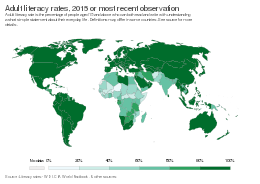Definitions and uses of the term literacy
– World illiteracy halved between 1970 and 2015.
– The diversity among the definitions of literacy used by NGOs, think tanks, and advocacy groups since the 1990s suggests an ongoing and uneven shift in understanding.
– The 2003 National Assessment of Adult Literacy (USA) included quantitative literacy (numeracy) in its definition.
– In 2015, the United Nations Statistics Division defined the youth literacy rate as the percentage of the population aged 15–24 years who can both read and write with understanding.
– In 2016, the European Literacy Policy Network defined literacy as the ability to read and write in all media, including digital literacy.
Social and cultural elements
– The concept of literacy is understood within specific contexts.
– Linguist James Paul Gee described reading and writing outside of a specific context as incoherent.
– Literacy is influenced by social and cultural factors.
– Literacy practices vary across different communities and societies.
– Literacy is not limited to alphabetic literacy but includes various forms of communication and media.
Literacy rates and trends
– Adult literacy rates have improved over time.
– Illiteracy rates in France decreased in the 18th and 19th centuries.
– The study of literacy as a concept can be divided into two periods: before 1950 and after 1950.
– Literacy rates are measured and monitored by organizations such as UNESCO and the OECD.
– Literacy rates are influenced by education policies and initiatives.
Expanded definitions of literacy
– Literacy is not limited to reading and writing but includes other skills and knowledge.
– Computer literacy refers to the ability to use computers and digital technology.
– Statistical literacy involves understanding and reasoning with statistics and data.
– Media literacy focuses on analyzing media production and representation.
– Health literacy is the ability to understand healthcare information.
Criticisms and debates
– The concept of multiliteracies recognizes the interactive and technological nature of reading.
– Some argue that multiliteracies downplay the importance of alphabetic reading instruction.
– Word reading is fundamental for various forms of communication.
– The term literacy is also used to refer to knowledge or skill in specific fields such as computer literacy and ecological literacy.
– There are ongoing debates and discussions about the definition and scope of literacy.
This article has multiple issues. Please help improve it or discuss these issues on the talk page. (Learn how and when to remove these template messages)
|
Literacy in its broadest sense describes "particular ways of thinking about and doing reading and writing" with the purpose of understanding or expressing thoughts or ideas in written form in some specific context of use. In other words, humans in literate societies have sets of practices for producing and consuming writing, and they also have beliefs about these practices. Reading, in this view, is always reading something for some purpose; writing is always writing something for someone for some purpose. Beliefs about reading, writing and their value for society and for the individual always influence the ways literacy is taught, learned, and practiced.
H.S. Bhola described Sarah Gudschinsky's definition of literacy as "essential": "A person is literate who can 'read and understand everything he would have understood if had been spoken to him; and can write, so that it can be read, anything he can say'." This definition focuses on comprehension and was created thinking of mother "tongue literacy", and does not include reciting passages in another language that the person does not understand.
Some researchers suggest that the study of "literacy" as a concept can be divided into two periods: the period before 1950, when literacy was understood solely as alphabetical literacy (word and letter recognition); and the period after 1950, when literacy slowly began to be considered as a wider concept and process, including the social and cultural aspects of reading and writing and functional literacy.

1912 NW 143rd Ave #24,
Portland, OR 97229, USA